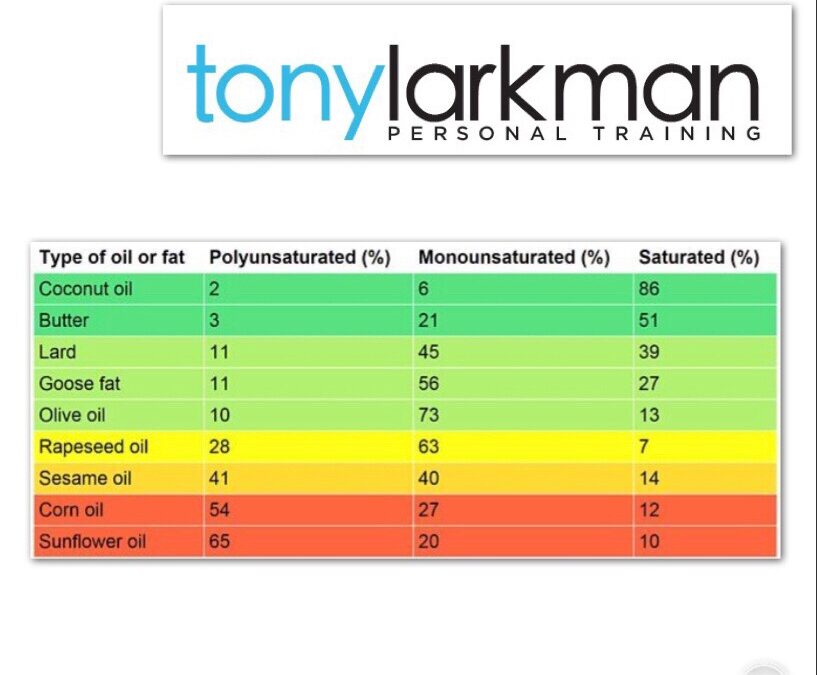Healthy Cooking Oils
There are many debates on eating healthily, ideas on the best diet to follow and what healthy cooking oil or fat should be used. As a Personal Trainer, I advise most of my clients to cook with butter, ghee or coconut oil and to follow The Mediterranean Diet.
I know that Bath, England is over 1000 miles north of the Mediterranean, but the health benefits are far reaching. Supermarkets and local independent food markets worldwide stock the ingredients of the Mediterranean Diet.
The healthy preference is to follow the Mediterranean Diet rules. Eat a variety of fresh vegetables and fruit, dairy sources such as Greek Yoghurt, organic free-range meats, wild fish and seafood. Plus include nuts, beans and whole grains.
Maybe some dark chocolate but moderate your intake to get the heath benefits. I know it’s not part of the traditional Mediterranean Diet but I adore dark chocolate and yes, as a personal trainer, I eat dark chocolate.
Cooking with oils and fats
However, have you ever wondered about the oils and fats you are cooking with. The effects it may be having on your health. There are a number of oils and fats you can cook with. Olive oil, ghee, butter, coconut oil, sunflower oil, peanut oil, avocado oil, vegetable oil etc. The list goes on.
Research from De Montford University in 2015 by Professor Martin Grootveld and televised on the BBC programme ‘Trust Me I’m a Doctor‘ highlighted that heating oils and fats changes their molecular structure and could be harmful to our health.
Smoke Point
The ‘smoke point‘ is the temperature at which an oil starts to smoke. This occurs when the components of the oil start to breakdown. As a result, olive oil has a very low ‘smoke point’.
By heating oils and fats at a high temperature, the change in structure produces oxidative stress. This has been linked to increased risk of heart disease, cancer, rheumatoid arthritis, Alzheimers, chronic inflammation and stroke.
The production of free radicals damages the body’s cells, proteins and DNA. The imbalance between the production of free radicals and the body’s inability to counteract their damaging effects through neutralisation with antioxidants results in healthy cells becoming damaged and contributes to diseases.
Aldehydes
Aldehydes are categorised as very high levels of oxidative stress products. Oils which are rich in unsaturated fatty acids generate very high levels of Aldehydes when exposed to high temperatures. Oils and fats which are rich in saturated fatty acids (butter, coconut oil) produced fewer Aldehydes.
This is due to the carbon atoms of saturated fats being composed of four single covalent bonds compared with unsaturated fats which have carbon-carbon double bonds. This makes the oil more susceptible to oxidation.
Monounsaturated fats such as olive oil contain one carbon-carbon double bond and polyunsaturated fats such as sunflower oil and corn oil contain two or more carbon-carbon double bonds making them less stable when heated, thus producing high levels of Aldehydes.
What oils to cook with
Oils rich in saturated fats are best to cook with. This does go against previous expert health advice. Butter, ghee and coconut oil tops the list as these structures stay relatively unchanged from cooking.
Olive Oil
A favourite ingredient of the Mediterranean Diet which has high levels of monounsaturated fats and therefore is more stable under thermal stress but sits below butter, ghee and coconut oil for cooking.
As we all know, olive oil is a very healthy addition to your salad, vegetables or wholegrains. It is rich in antioxidants, helps to maintain healthy cholesterol levels and may prevent strokes and cardiovascular diseases, but avoid cooking with it.
Extra virgin olive oil is only pressed once and this produces the highest quality. Being virgin describes the oil as being produced without chemical additives and therefore has a fuller flavour.
Cold pressed describes the olive paste being slowly warmed to room temperature (81 degrees Fahrenheit / 27 degrees Celsius) in order to protect the delicate flowers instead of using hot water and steam to extract the oil.
This enables the oil to contain high amounts of monounsaturated fatty acids (lower risks of heart disease and stroke according to the Academy of Nutrition and Dietetics) by reducing high levels of LDL (bad cholesterol) and increases polyphenols and antioxidants. First cold pressed olive oil contains the highest amount of nutrients.
Conclusion
As our ancestors evolved and started cooking food, they unknowingly created new potential health risks that we are only now starting to understand.
With new research, the evidence is becoming clearer about cooking oils and fats and the precautions we should take when using them. And as a personal trainer, it is important to understand the science so we can advise clients.
The research suggests that cooking with saturated fats such as ghee, butter or coconut oil is healthier for us . Avoid cooking with unsaturated fats as the chemical structure of these oils change which releases toxic oxidative products that can potentially damage health.
And it’s not just oils and fats that release toxins when heated. Red meat heated up to a high temperature can release Heterocyclic Amines (HCO’s) and Polycyclic Aromatic Hydrocarbons (PAHs) which are capable of damaging DNA when metabolised by specific enzymes in the body.
If you’re like me and love olive oil, go ahead and enjoy the health benefits on your food. Just avoid using olive oil for cooking. Always use first cold-pressed olive oil. Don’t barbecue your meat to a crisp. Cook with saturated fats and have your steak medium rare. And yes, personal trainers eat dark chocolate.

